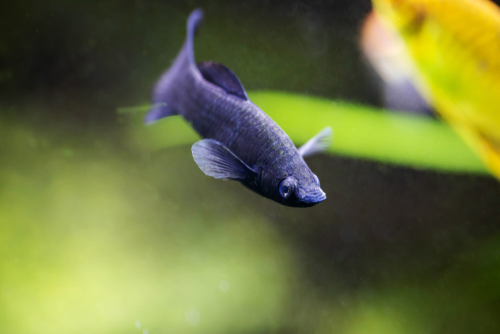Guppies are among the most popular fish species kept in home aquariums. These small, colorful fish are easy to care for and can thrive in a variety of environments.
However, providing them with the right nutrition is crucial for their health and well-being. In this article, we will explore what to feed guppies to ensure they receive the necessary nutrients for optimal growth and development.
Understanding Guppies’ Nutritional Needs Guppies are omnivorous, which means they require a balanced diet of both plant and animal-based foods.
They need protein for growth and repair, carbohydrates for energy, and vitamins and minerals for overall health. In the wild, guppies feed on algae, small insects, and other small aquatic creatures.
In captivity, it’s essential to replicate their natural diet as much as possible to keep them healthy.
Contents
Key Takeaways on What to Feed Guppies
- Guppies require a balanced diet of both plant and animal-based foods to meet their nutritional needs.
- Feeding adult guppies and guppy fry requires different types of food and feeding schedules.
- Choosing high-quality guppy food and maintaining a healthy aquarium environment are essential for their overall health.
Check out these other popular picks in this category:
Understanding Guppies’ Nutritional Needs
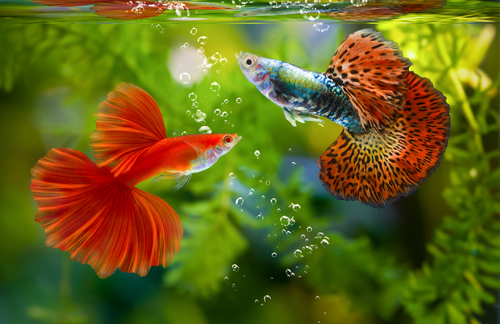
Guppies are omnivores, which means they require a balanced diet of both animal and plant-based foods. Their nutritional needs are primarily based on protein, vitamins, minerals, and other essential nutrients that are necessary for their healthy growth and development.
Protein Diet
Protein is an essential component of a guppy’s diet as it helps in building and repairing tissues, maintaining healthy skin and scales, and supporting a healthy immune system.
A protein-rich diet can be provided to guppies by feeding them live or frozen foods like brine shrimp, daphnia, and bloodworms.
Vitamins and Minerals
Vitamins and minerals are also essential nutrients that guppies require. Vitamins like A, C, and E are necessary for maintaining healthy eyesight, skin, and reproductive health.
Minerals like calcium and phosphorus are crucial for maintaining healthy bones, teeth, and scales.
Nutrients
Apart from protein, vitamins, and minerals, guppies also require other essential nutrients like fats, carbohydrates, and fiber. These nutrients can be provided to guppies by feeding them a variety of foods like algae, spirulina, and vegetables.
Healthy Diet
A healthy diet for guppies should consist of a variety of foods that provide all the essential nutrients that they require. Overfeeding can lead to obesity and other health issues, so it’s important to feed them in moderation.
Types of Food for Guppies
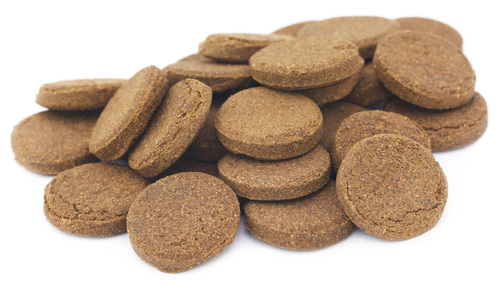
When it comes to feeding guppies, it’s important to offer a variety of foods to ensure they receive a balanced diet. Here are some types of food that are suitable for guppies:
Protein-Rich Foods
Guppies require protein for growth and development. Some protein-rich foods that are suitable for guppies include:
- Flakes: High-quality fish flakes are a convenient and affordable way to provide protein to your guppies.
- Shrimp and Daphnia: These small crustaceans are a great source of protein and can be fed fresh or freeze-dried.
- Worms: Live or freeze-dried bloodworms, earthworms, and tubifex worms are all suitable for guppies.
- Pellets: High-quality fish pellets that are specifically formulated for guppies can provide a balanced diet that includes protein.
Vegetable-Based Foods
While guppies require protein, they also need plant matter in their diet. Some vegetable-based foods that are suitable for guppies include:
- Peas, Carrots, Zucchini, Cabbage, Lettuce, and Broccoli: These vegetables can be cooked or blanched and then chopped into small pieces.
- Algae and Plants: Guppies will nibble on algae and live plants in their aquarium. You can also provide them with dried seaweed or algae wafers.
- Flake Foods: Some high-quality flake foods contain vegetable matter and can provide a balanced diet for guppies.
Live and Freeze-Dried Foods
Live and freeze-dried foods can provide guppies with a variety of nutrients and can be a great addition to their diet. Some live and freeze-dried foods that are suitable for guppies include:
- Brine Shrimp: These small crustaceans are a great source of protein and can be fed live or freeze-dried.
- Mosquito Larvae: These larvae are a great source of protein and can be found in standing water.
- Baby Brine Shrimp: These tiny shrimp are a great source of protein for young guppies.
- Microworms: These small worms can be cultured at home and are a great source of protein.
- Daphnia: These small crustaceans are a great source of protein and can be fed live or freeze-dried.
By offering a variety of these types of food, guppies can receive a balanced diet that includes protein, plant matter, and other essential nutrients.
It’s important to feed guppies small amounts several times a day, rather than one large meal, to prevent overfeeding and maintain good water quality in the aquarium.
Feeding Adult Guppies vs Guppy Fry
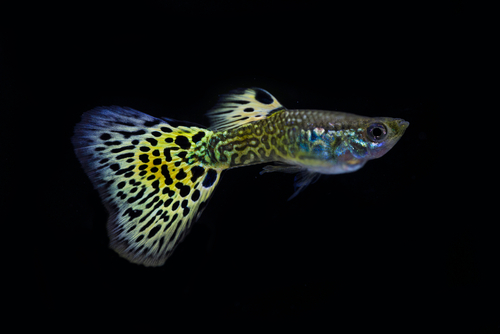
Feeding Adult Guppies
Adult guppies have a relatively simple diet that can be met with a variety of commercial foods.
They can be fed flakes, pellets, or frozen foods that are specifically formulated for tropical fish. It is important to provide a balanced diet that includes protein, fats, and carbohydrates.
Adult guppies have small mouths, so it is important to choose foods that are small enough for them to eat.
Flake food is a popular choice because it can be broken down into small pieces that are easy for guppies to consume. Pellets can also be a good choice, but they should be small and soft enough for guppies to swallow.
It is recommended to feed adult guppies twice a day, with only the amount of food they can consume in a few minutes. Overfeeding can lead to health problems, such as obesity, bloating, and swim bladder issues.
Feeding Guppy Fry
Guppy fry have different nutritional needs than adult guppies. They require more protein and less carbohydrates in their diet. Fry can be fed a combination of live, frozen, and commercial foods.
Live foods, such as baby brine shrimp and micro worms, are a great source of protein for guppy fry. Frozen foods, such as daphnia and bloodworms, can also be fed to provide variety in their diet.
Commercial foods that are specifically formulated for fry can also be fed, but it is important to choose foods that are small enough for their small mouths.
Guppy fry should be fed small amounts of food several times a day. It is recommended to feed them every 2-3 hours, with only the amount of food they can consume in a few minutes.
Overfeeding can lead to health problems, such as constipation and swim bladder issues.
Feeding Schedule and Quantity
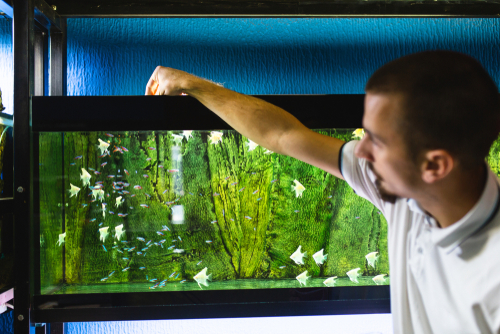
Establishing a feeding schedule is important to ensure that guppies receive the proper amount of food and avoid overfeeding.
Guppies should be fed twice a day, once in the morning and once at night, with no more than what they can consume in two to three minutes.
Overfeeding can lead to constipation, which can result in swim bladder disease. This is a condition where the swim bladder, which helps fish maintain buoyancy, becomes inflamed and causes the fish to swim awkwardly or even float upside down.
To prevent overfeeding, it is recommended to use a small amount of food at a time and observe the guppies to see how much they eat. If there is leftover food after two to three minutes, it is recommended to remove it from the tank.
The quantity of food to feed guppies depends on their size and age. As a general rule, a pinch of food per fish is sufficient. However, it is important to adjust the amount of food based on the guppies’ appetite and to avoid overfeeding.
Choosing Quality Guppy Food
When it comes to feeding guppies, it is important to choose a high-quality fish food that meets their nutritional needs. Here are some things to consider when choosing guppy food:
1. Nutritional Content
Guppies require a balanced diet that includes protein, fats, vitamins, and minerals. Look for fish flakes or pellets that contain a variety of ingredients, such as shrimp, krill, and spirulina, to ensure your guppies get a well-rounded diet.
Additionally, make sure the food contains iron and calcium, which are essential for maintaining healthy bones and blood cells.
2. Natural Color Enhancers
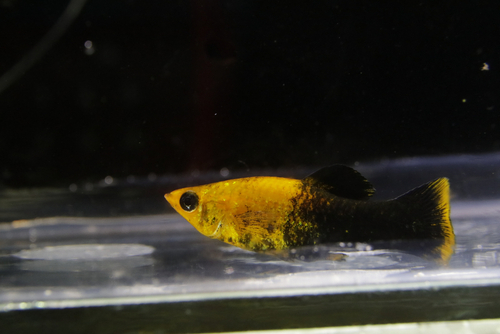
Many guppy owners want their fish to have vibrant colors, so look for food that contains natural color enhancers like beta-carotene or astaxanthin.
These ingredients can help bring out the red, orange, and blue hues in your guppies.
3. Convenient Options
If you have a busy schedule, consider choosing guppy food that is easy to use and store. Fish flakes and pellets are both convenient options that can be easily dispensed and stored.
4. Avoid Goldfish Food
While it may be tempting to feed your guppies goldfish food, it is not recommended. Goldfish require a different nutritional profile than guppies, and feeding them the wrong food can lead to health problems.
5. Where to Buy
You can find guppy food at most pet stores or online fish shops. It is important to choose a reputable brand and read reviews before making a purchase.
By choosing high-quality guppy food, you can help ensure your fish stay healthy and vibrant.
Navigating the Guppy Pantry: Alternatives When You’re Out of Standard Feed
When you find yourself in a pinch without commercial guppy food, there’s no need to panic. Guppies are wonderfully adaptable, with a varied diet that allows for some improvisation. That said, it’s crucial to understand what to feed guppies from your home stock and how long guppies can go without food before it becomes a concern.
Vegetables serve as a reliable emergency substitute, as guppies happily munch on spinach, lettuce, carrots, and even broccoli. But remember, presentation is key. For veggies with a jelly-like core—think tomatoes and cucumbers—make sure to scoop out the center to maintain your aquarium’s water quality. For the remaining vegetable matter, slice it into pieces small enough to fit into a guppy’s mouth. If you’re dealing with harder vegetables, a brief steam can soften them up without stripping away essential nutrients.
Switching gears, if you’re looking to diversify their protein intake, options like beef hearts, egg yolks, or chicken breast can also work in small quantities. Just boil thoroughly, remove visible fats, and dice them into digestible portions. This is particularly beneficial for guppy fry, which often require more protein for proper growth.
Before you leap into culinary action, consider a couple of cautionary notes. First, this substitute feed should only be a temporary fix. A long-term lack of proper commercial food can lead to nutrient deficiencies, potentially causing issues like guppy constipation. Also, steer clear of human processed foods like cereals or bread; these contain additives detrimental to guppies’ health.

Another question that may cross your mind is, “Can guppies eat goldfish food?” The answer is yes, but sparingly, as goldfish food lacks some nutrients essential for guppies. A better question to ponder is “What does guppy eat regularly?” to ensure a balanced diet in the long run.
In conclusion, while it’s possible to temporarily substitute with home foods, it’s not a sustainable practice for fulfilling all the dietary needs of your guppies. Aim to replenish your stock of specialized food for guppies as soon as possible. Always keep tabs on your tank’s conditions and the health of your fish to avoid unforeseen issues like overfeeding or guppy constipation.
Maintaining Healthy Aquarium Environment
Maintaining a healthy aquarium environment is essential for the survival of pet fish, especially freshwater fish like guppies.
A clean and well-maintained aquarium tank is not only visually appealing but also ensures the health and well-being of the fish.
One of the crucial aspects of maintaining a healthy aquarium environment is to keep the water parameters in check.
The water should be tested regularly to ensure that the pH, ammonia, nitrite, and nitrate levels are within the appropriate range. High levels of these parameters can be harmful to the fish and can cause stress, illness, and even death.
Fouling the water is another factor that can affect the health of the fish. Overfeeding or leaving uneaten food in the tank can lead to the accumulation of waste and debris, which can foul the water.
Regular water changes and cleaning of the tank can help prevent fouling and maintain a healthy environment.
Live plants can also play a vital role in maintaining a healthy aquarium environment. They not only add to the aesthetics of the tank but also help absorb excess nutrients and provide oxygen to the fish.
It is essential to choose plants that are compatible with the fish and the water parameters of the tank.
Maintaining the right male to female ratio is also crucial for the health of guppies. An imbalance in the ratio can lead to stress and aggression among the fish, which can affect their health and well-being.
Guppies can be picky eaters, and it is essential to provide a balanced diet that meets their nutritional requirements.
A varied diet that includes both commercial fish food and live or frozen food can help keep the fish healthy and active.
Proper lighting is also essential for maintaining a healthy aquarium environment. It not only enhances the beauty of the tank but also plays a crucial role in the growth and development of live plants.
It is important to choose the right type and intensity of light for the fish and plants in the tank..
Common Feeding Mistakes to Avoid
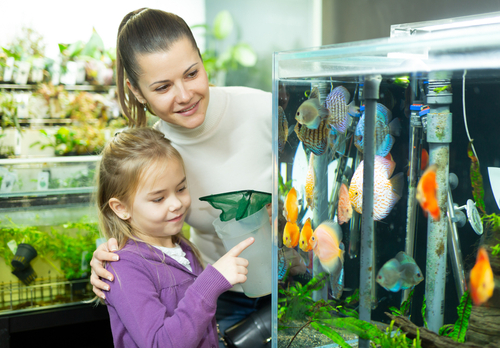
Feeding guppies is not difficult, but there are some common mistakes that can be detrimental to their health and well-being. Here are some mistakes to avoid when feeding your guppies:
1, Overfeeding
Overfeeding is perhaps the most common mistake when it comes to feeding guppies. It’s easy to get carried away with feeding, especially when the fish are eager to eat.
However, overfeeding can lead to a number of problems, such as constipation, swim bladder disease, and fouling the water. To avoid overfeeding, it’s important to feed your guppies only what they can eat in a few minutes.
If there is any food left over, remove it from the tank. It’s also a good idea to feed your guppies small meals throughout the day rather than one large meal.
2. Constipation
Constipation is a common problem in guppies, and it’s often caused by overfeeding. When guppies are constipated, they may become lethargic and lose their appetite. They may also have trouble swimming properly.
To avoid constipation, make sure you’re feeding your guppies a balanced diet that includes high-quality flakes or pellets.
You can also supplement their diet with live or frozen foods, such as brine shrimp or bloodworms. It’s also important to avoid overfeeding, as this can lead to constipation.
3. Swim Bladder Disease
Swim bladder disease is another common problem in guppies, and it’s often caused by overfeeding or constipation.
When guppies have swim bladder disease, they may have trouble swimming properly and may float to the top or sink to the bottom of the tank.
To avoid swim bladder disease, it’s important to feed your guppies a balanced diet and avoid overfeeding. You can also try feeding your guppies foods that are high in fiber, such as peas.
4. Fouling the Water
Overfeeding can also lead to fouling the water, which can be harmful to your guppies. When there is too much food in the tank, it can decompose and release harmful toxins into the water.
To avoid fouling the water, make sure you’re feeding your guppies only what they can eat in a few minutes. If there is any food left over, remove it from the tank.
You should also perform regular water changes to keep the water clean and healthy for your guppies.
5. Picky Eaters
Some guppies can be picky eaters, and it can be difficult to get them to eat a balanced diet. If your guppies are picky eaters, try offering them a variety of foods, such as flakes, pellets, and live or frozen foods.
You can also try soaking their food in garlic juice or other attractants to entice them to eat.
Conclusion
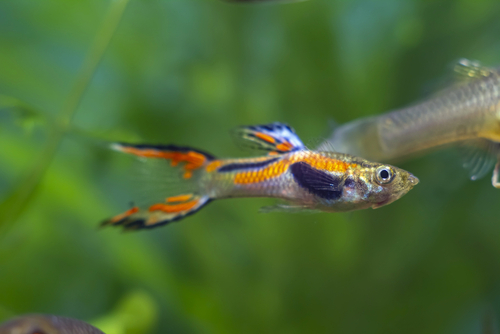
Guppies are easy to feed and care for. They are omnivorous, which means they will eat both plant and animal matter. It is important to provide a balanced diet for guppies to ensure their health and longevity.
A varied diet of high-quality flakes, pellets, and frozen foods is recommended. Live foods such as brine shrimp and daphnia can also be given as a treat. It is important to avoid overfeeding as this can lead to health problems such as obesity and bloating.
In addition to food, it is important to provide a clean and healthy environment for guppies. Regular water changes, proper filtration, and maintaining appropriate water parameters will help ensure their health and happiness.
Frequently Asked Questions
What are some vegetables that guppies can eat?
Guppies are omnivores and can eat a variety of vegetables. Some good options include blanched spinach, zucchini, cucumber, and peas. It is important to remove any uneaten vegetables from the tank to prevent them from fouling the water.
Can guppies eat tropical fish food?
Yes, guppies can eat tropical fish food. However, it is important to choose a high-quality food that is specifically formulated for tropical fish.
Look for a food that is high in protein and includes a variety of ingredients to ensure that your guppies are getting all the nutrients they need.
What is the best food for guppy growth?
A high-protein diet is essential for guppy growth. Look for a food that is specifically formulated for young or growing fish. You can also supplement their diet with live or frozen foods like brine shrimp or daphnia.
What is the best food for enhancing guppy colors?
Color-enhancing foods can help bring out the vibrant colors in your guppies. Look for a food that includes ingredients like spirulina, krill, or astaxanthin.
These ingredients can help enhance the reds, blues, and greens in your guppies’ fins and bodies.
How often should guppies be fed?
Guppies should be fed small amounts of food 2-3 times per day. Overfeeding can lead to health problems and can also cause the water quality in the tank to degrade.
How long can guppies go without eating?
Guppies can go up to a week without eating, but it is not recommended to let them go that long.
It is important to establish a regular feeding schedule to ensure that your guppies are getting the nutrients they need to stay healthy and vibrant.

Veteran fish keeper and keen hobbyist with a serious case of MTS. My midlife crisis was the establishment of a fish room, much to my wife’s horror. Little does she know it could be worse!!


